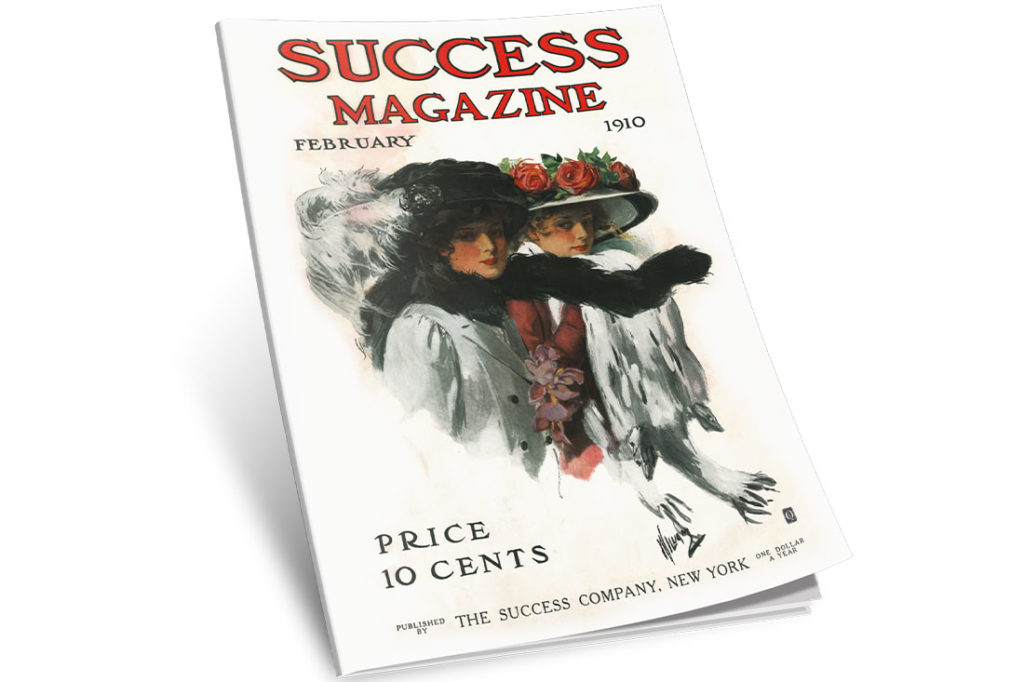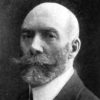Carlyle has said that a collection of books is a university. What a pity that the thousands of ambitious, energetic people who missed their opportunities for an education at the school age, and feel crippled by their loss, fail to catch the significance of this, fail to realize the tremendous cumulative possibilities of that great life-improver, that admirable substitute for a college or university education: reading. Many of the world’s most eminent people acquired an excellent education mainly by reading. Franklin, the printer’s devil, by self-effort, self-discipline and self-schooling, educated himself so well that the extent of his knowledge surprised the haughty English lords and the incredulous French scientists and authors.
Elihu Burritt, working all day in a blacksmith’s shop, had little opportunity for education, yet through his industry and love of reading and study, he became one of the greatest linguists in the world, and won for himself the honorable sobriquet of “the learned blacksmith.” Speaking of Burritt’s profound learning, Edward Everett said, “It is enough to make one who has had good opportunities for education hang his head in shame.”
The trouble with many of those who lack early opportunities and many others who see no chance for a college course, and say they have no opportunity for self-improvement, is that if they cannot set aside several years for schooling or college, they think it is of no use to try to educate themselves. They do not realize the wealth that exists in spare moments—what can be accomplished in them and the opportunities they offer for repairing the loss of a college education. Even 10 or 15 minutes spent each day in concentrating the mind in thinking, in reading with a purpose, will enlarge your mental capacity and add to your knowledge to an extent of which you have no conception. At the end of the year you will see the change in yourself.
I know a man who went to school only a few months during his life, but who is one of the most informed men I have ever met. The very consciousness that he lacked the advantages of an early education spurred him on to make up for the deficiency in other ways. By reading in his spare moments he has absorbed an amount of information that surprises people who know him. His knowledge on many subjects, such as history, astronomy, geology, political economy and psychology, is so great that most people take him for a college graduate.
It is really wonderful how much can be gained by improving odds and ends of time in keen, analytical observing, thinking, reading and studying. Think of the untold wealth locked up in the spare moments and long winter evenings of every life. It is possible to pick up an education in the odds and ends of time most people throw away.
If those who have been deprived of a college education would only make up their minds to get a substitute for it, they would be amazed to see what even the evenings of a few weeks devoted conscientiously to the college studies would accomplish.
When a noted literary man was asked how he managed to accomplish so much with so little friction or apparent effort, he replied, “By organizing my time. To every hour its appointed task or duty, with no overlapping or infringements.”
There is a great deal of time wasted even in the busiest lives, which, if properly organized, might be used to advantage. Many people would be amazed to find how much they would have if they would more thoroughly systematize their work. Order is a great time-saver, and we certainly ought to be able to so adjust our living plan that we can have a fair amount of time for self-improvement, for enlarging life. Yet many people think their only opportunity for self-improvement depends on the time left after everything else has been attended to.
Still, most of us manage to find time for the things we love. If one is hungry for knowledge, if one yearns for self-improvement, if one has a taste for reading, they will make the opportunity to satisfy their desires.
Think of young Abe Lincoln being so busy that he could not find time to think, to read, to improve his mind. It was said by one who early knew him that “he lost no time at home; when he was not at work he was at his books; and he carried his books to work that he might read when released from labor.”
Vice President Wilson, when a boy, was bound out on a farm and obliged to work from daylight to dark, but he found time to educate himself. Before he was 21 he had read a thousand volumes.
Where the heart is, there is the treasure. Where the ambition is, there is time.
It takes not only resolution but determination to set aside unessentials for essentials, things pleasant and agreeable today for the things that will prove best for us in the end. There is always temptation to sacrifice future good for present pleasure; to put off reading to a more convenient season while we enjoy idle amusements or waste the time in gossip or frivolous conversation.
The greatest things of the world have been done by those who systematized their work, organized their time. People who have left their mark on the world have appreciated the preciousness of time, regarding it as the great quarry out of which they have carved reputations or fortunes, hewn instruments with which to continue other work of progress and civilization.
The faithfulness with which you improve every spare moment, every little chance to develop yourself to your highest possible power, is an indication of the sort of person you will be, the sort of person you are; it is an evidence of the ability that wins.
Lincoln used to say that there was a good education in the newspapers. He applied for the position of postmaster in New Salem because he was too poor to subscribe for papers, and he knew that he could read those which came through the post office for others, as the country was sparsely settled and many people did not call for their mail more than once or twice a week. He thought he was one of the most fortunate persons in the world to have access to this, to him a rich mine of knowledge.
The reading habit, if not abused, will not only give you infinite pleasure and profit, but it will make you a larger, fuller, better informed, more interesting person, a better worker.
How heroic we feel after reading the inspiring life story of someone who has achieved great things under difficulties. We feel almost as if we were the hero ourselves for the time being, just as we do sometimes after seeing some great character in a stirring play. For the moment we assume the personality which has stirred our sympathy and aroused our admiration. We feel that we actually have the qualities which we admire.
Great inspiring life stories of those who have won and pushed their way to the front against all sorts of obstacles have proved the turning point in tens of thousands of careers. They have encouraged the disheartened to hold on when they were ready to let go; they have induced them to persevere when they had decided to turn back. They have given them fresh hope and renewed confidence in themselves when those dearest to them even had predicted failure and had told them that to continue would be to waste their time.
Samuel Smiles’ Self-Help was a wonderful stimulus to me, and I believe it has proved the turning point in the careers of tens of thousands of youths. Nothing else is more fascinating than the romance of achievement under difficulties. The youth full of hope, bubbling over with enthusiasm, reads the life stories of individuals who have succeeded under difficulties, and says to themselves, “Why can’t I do it?” To which something within them replies, “I can, and I will!”
In order to get the most out of books, the reader must be a thinker. The mere acquisition of facts is not the acquisition of power. To fill the mind with knowledge that cannot be made available is like filling our houses up with furniture and bric-a-brac until we have no room to move about.
Food does not become physical force, brain or muscle until it has been thoroughly digested and assimilated, and has become an integral part of the blood, brain and other tissues. Knowledge does not become power until digested and assimilated by the brain, until it has become a part of the mind itself.
If you wish to become intellectually strong, after reading with the closest attention, form this habit: Frequently close your book and sit and think, contemplate, reflect. Turn what you have read over and over in your mind.
Read, read, read all you can. If you want to develop a delightful form of enjoyment, to cultivate a new pleasure, a new sensation which you have never before experienced, begin to read good books, good periodicals, regularly every day. Do not tire yourself by trying to read a great deal at first. Read a little at a time, but read some every day, no matter how little. If you are faithful you will soon acquire a taste for reading—the reading habit; and it will, in time, give you infinite satisfaction and unalloyed pleasure.
This article originally appeared in the May/June 2022 Issue of SUCCESS magazine.




